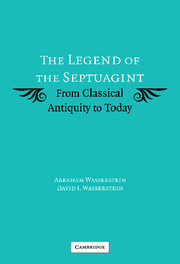Book contents
- Frontmatter
- Contents
- Preface and Acknowledgments
- Abbreviations
- Introduction
- 1 The Letter of Aristeas
- 2 The Hellenistic Jewish Tradition
- 3 The Rabbis and the Greek Bible
- 4 The Ptolemaic Changes
- 5 The Church Fathers and the Translation of the Septuagint
- 6 Among the Christians in the Orient
- 7 The Muslims and the Septuagint
- 8 Yosippon and the Story of the Seventy
- 9 Karaites, Samaritans and Rabbanite Jews in the Middle Ages
- 10 The Septuagint in the Renaissance and the Modern World
- Conclusion
- Appendix: In Partibus Infidelium: Zosimus of Panopolis
- Bibliography and Sources
- Index
9 - Karaites, Samaritans and Rabbanite Jews in the Middle Ages
Published online by Cambridge University Press: 17 July 2009
- Frontmatter
- Contents
- Preface and Acknowledgments
- Abbreviations
- Introduction
- 1 The Letter of Aristeas
- 2 The Hellenistic Jewish Tradition
- 3 The Rabbis and the Greek Bible
- 4 The Ptolemaic Changes
- 5 The Church Fathers and the Translation of the Septuagint
- 6 Among the Christians in the Orient
- 7 The Muslims and the Septuagint
- 8 Yosippon and the Story of the Seventy
- 9 Karaites, Samaritans and Rabbanite Jews in the Middle Ages
- 10 The Septuagint in the Renaissance and the Modern World
- Conclusion
- Appendix: In Partibus Infidelium: Zosimus of Panopolis
- Bibliography and Sources
- Index
Summary
Among medieval Jews the legend of the Seventy enjoyed much currency. We know that the rabbinic texts discussed earlier, with their accounts of the genesis of the LXX, were in wide circulation among Jews both in the Islamic world and in the developing communities of Christian Europe. And we have a number of new witnesses to the tale from writers among the Jews of the medieval world themselves. These surprise both by their range and by their content. In addition to the numerous authors influenced by Yosippon examined in Chapter 8, we have testimonies from the sectarian Jewish communities of the Karaites and the Samaritans as well as from the mainstream Rabbanite Jews. The Karaites see the story as laden with potential in their polemics against the Rabbanites. Similarly, the Samaritans take their knowledge of the story from rabbinic sources, but use it to attack those sources. Among the Rabbanites themselves, however, although the miraculous element in the story is not forgotten or questioned, the legend as a whole is incorporated into the historical and pseudo-historical works that are now beginning to appear.
For reasons which remain obscure, the Karaites separated themselves from the bulk of Jewry, probably in the ninth century. Somewhat like the Samaritans, they claimed that they followed only the sacred texts of Scripture and rejected such later writings as the Mishnah and the Talmuds.
- Type
- Chapter
- Information
- The Legend of the SeptuagintFrom Classical Antiquity to Today, pp. 217 - 237Publisher: Cambridge University PressPrint publication year: 2006



